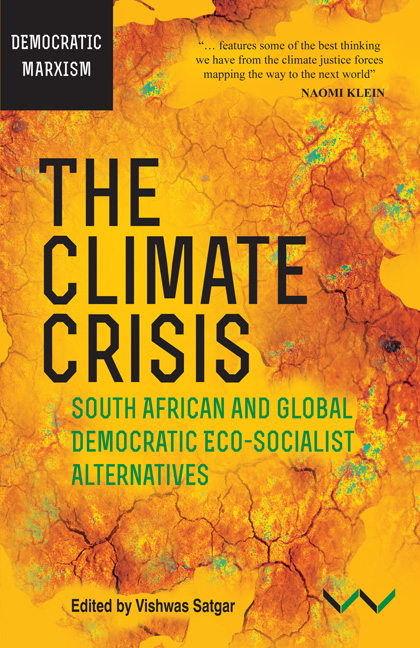Book contents
- Frontmatter
- Contents
- Tables and Box
- Acknowledgements
- Acronyms and Abbreviations
- Chapter 1 The Climate Crisis and Systemic Alternatives
- PART ONE THE CLIMATE CRISIS AS CAPITALIST CRISIS
- PART TWO DEMOCRATIC ECO-SOCIALIST ALTERNATIVES IN THE WORLD
- PART THREE DEMOCRATIC ECO-SOCIALIST ALTERNATIVES IN SOUTH AFRICA
- Chapter 10 The Climate Crisis and a ‘Just Transition’ in South Africa: An Eco-Feminist-Socialist Perspective
- Chapter 11 Energy, Labour and Democracy in South Africa
- Chapter 12 Capital, Climate and the Politics of Nuclear Procurement in South Africa
- Chapter 13 Climate Jobs at Two Minutes to Midnight
- Chapter 14 Deepening the Just Transition through Food Sovereignty and the Solidarity Economy
- Chapter 15 Eco-Capitalist Crises in the ‘Blue Economy’: Operation Phakisa's Small, Slow Failures
- CONCLUSION
- Contributors
- Index
Chapter 14 - Deepening the Just Transition through Food Sovereignty and the Solidarity Economy
from PART THREE - DEMOCRATIC ECO-SOCIALIST ALTERNATIVES IN SOUTH AFRICA
Published online by Cambridge University Press: 05 June 2019
- Frontmatter
- Contents
- Tables and Box
- Acknowledgements
- Acronyms and Abbreviations
- Chapter 1 The Climate Crisis and Systemic Alternatives
- PART ONE THE CLIMATE CRISIS AS CAPITALIST CRISIS
- PART TWO DEMOCRATIC ECO-SOCIALIST ALTERNATIVES IN THE WORLD
- PART THREE DEMOCRATIC ECO-SOCIALIST ALTERNATIVES IN SOUTH AFRICA
- Chapter 10 The Climate Crisis and a ‘Just Transition’ in South Africa: An Eco-Feminist-Socialist Perspective
- Chapter 11 Energy, Labour and Democracy in South Africa
- Chapter 12 Capital, Climate and the Politics of Nuclear Procurement in South Africa
- Chapter 13 Climate Jobs at Two Minutes to Midnight
- Chapter 14 Deepening the Just Transition through Food Sovereignty and the Solidarity Economy
- Chapter 15 Eco-Capitalist Crises in the ‘Blue Economy’: Operation Phakisa's Small, Slow Failures
- CONCLUSION
- Contributors
- Index
Summary
Realising a ‘just transition’ requires movement from below that mobilises to contest and reshape relations to overcome the structural barriers to such a transition. This brings to the fore alternatives that seek to reshape humans’ relationships with the key factors that structure our lives and the planet, and which we shape, namely nature, the economy and, critically in this current conjuncture, food. The question of food is central to the climate crisis and the just transition because it ‘stands squarely at the crossroads of the ecological, social and financial crises and provides a graphic example of how they reinforce each other’ (George 2010: 110).
The struggle for food sovereignty is a grassroots response to these dimensions as experienced by peasant food producers and the hungry across the world, and its objectives traverse nature, society and the economy, contesting the relations between them. Food sovereignty is therefore about more than just food – it offers a path, informed by social movement struggle, out of the climate and social crises. The climate crisis and the barriers to confronting it are grounded in the capitalist logic of expansion. Within this dynamic, capitalism separates control over production from labour and nature. The solidarity economy is a response to the impacts arising out of this disarticulation, and aims to re-embed labour democratically within human creativity, production and nature (Wainwright 2014). As such, the solidarity economy and food sovereignty play crucial roles in advancing each other, and together provide important means to struggle for structural change to deepen the just transition.
We argue that the logics of food sovereignty and the solidarity economy are taking root at the grassroots in South Africa, in various, uneven and contextual ways. After exploring the food sovereignty and solidarity economy alternatives, and providing a background to the South African context, we provide a brief overview of the South African Food Sovereignty Campaign (SAFSC) to illustrate our argument. We conclude by posing a key challenge to consciously situate the solidarity economy and food sovereignty in the struggle for the commons as a means to deepen the just transition.
- Type
- Chapter
- Information
- Climate Crisis, TheSouth African and Global Democratic Eco-Socialist Alternatives, pp. 293 - 313Publisher: Wits University PressPrint publication year: 2018



